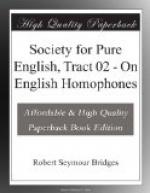[Sidenote: No direct proof]
It is plain that only general considerations can be of value, unless there should be very special evidence in any special case; and thus the caution of Dr. Henry Bradley’s remarks in note on page 19.
I remember how I first came to recognize this law; it was from hearing a friend advocating the freer use of certain old words which, though they were called obsolete and are now rarely heard, yet survive in local dialects. I was surprised to find how many of them were unfit for resuscitation because of their homophonic ambiguity, and when I spoke of my discovery to a philological friend, I found that he regarded it as a familiar and unquestioned rule.
But to prove this rule is difficult; and as it is an impossible task to collect all the obsolete words and classify them, I am proposing to take two independent indications; first to separate out the homophones from the other obsolete words in a Shakespearian glossary, and secondly, to put together a few words that seem to be actually going out of use in the present day, that is, strictly obsolescent words caught in the act of flitting.
[Sidenote: Obsolescence defined.]
Obsolescence in this connexion must be understood only of common educated speech, that is, the average speaker’s vocabulary. Obsolescent words are old words which, when heard in talk, will sound literary or unusual: in literature they can seem at home, and will often give freshness without affectation; indeed, any word that has an honourable place in Shakespeare or the Bible can never quite die, and may perhaps some day recover its old vitality.
[Sidenote: Evidence of obsolescence.]
The best evidence of the obsolescence of any word is that it should still be frequently heard in some proverb or phrase, but never out of it. The homophonic condition is like that of aural and oral, of which it is impossible to make practical use.[14] We speak of an aural surgeon and of oral teaching, but out of such combinations the words have no sense. It happens that oral teaching must be aural on the pupil’s side, but that only adds to the confusion.
[Footnote 14: The words aural and oral are distinguished in the pronunciation of the North Midlands and in Scotland, and the difference between the first syllables is shown in the Oxford dictionary. In Southern English no trace of differentiation remains.]
In deciding whether any obsolete homophone has been lost by its homophony, I should make much of the consideration whether the word had supplied a real need, by naming a conception that no other word so fitly represented; hence its survival in a proverb is of special value, because the words of proverbs are both apt and popular; so that for the disuse of such a word there would seem to be no other cause so likely and sufficient as damage to its signification.
The glossary is relied on to contain, besides its other items, all the obsolete words: the homophones separated out from these will show various grades of obsolescence, and very different values as examples bearing on the question at issue.




